Potato planting technology and management methods

|
Potato, commonly known as potato, is a crop widely grown throughout China, especially in spring. Although the planting and daily management of potatoes are relatively simple, some key planting techniques and management methods still need to be mastered to achieve high yields. Let's learn about potato planting techniques and management methods. 1. Choose the right variety Choose suitable high-yield potato varieties according to local climate and soil conditions. Different varieties have different adaptability to the environment. Choosing varieties with strong disease and pest resistance and high yield is the key to high yield. 2. Soil Preparation Potatoes prefer deep, well-drained soil rich in organic matter. Deep plowing should be carried out before planting to increase the soil's aeration and water retention capacity, while adjusting the soil pH to keep it neutral or slightly acidic. 3. Reasonable fertilization Potatoes need adequate fertilizer to support their growth, especially nitrogen, phosphorus and potassium fertilizers. Apply sufficient base fertilizer, such as fully decomposed organic fertilizer , and appropriate amount of chemical fertilizer to ensure adequate nutrient supply during potato growth. 4. Sowing at the right time Choose the appropriate sowing time according to local climatic conditions. Spring sowing is usually done when the soil temperature is stable at 7-8°C to ensure that the potatoes can germinate and grow smoothly. 5. Planting density Reasonably control the planting density to avoid being too dense or too sparse. Appropriate row and plant spacing can ensure that potatoes have enough space to grow while making full use of land and light resources. VI. Pest and disease control Check the growth of potatoes regularly to detect and deal with pests and diseases in a timely manner. Adopt an integrated control strategy, including agricultural control, physical control and chemical control, to reduce the impact of pests and diseases on potato yields . 7. Water Management Potatoes have a high demand for water, but are not tolerant to waterlogging. Irrigate properly, keep the soil moist, and avoid prolonged waterlogging to prevent the occurrence of potato root diseases. 8. Cultivation and loosening of soil During the growth of potatoes, timely tillage and loosening of the soil will help improve soil structure, promote root development, and reduce weed growth. 9. Plant Adjustment During the growth of potatoes, appropriate adjustments should be made to the plants, such as topping and pruning, to control the growth of the plants and promote the concentrated supply of nutrients to the underground tubers. 10. Harvest at the right time Harvest potatoes in time according to their maturity to avoid harvesting too late which may cause the potatoes to deteriorate in quality or suffer frost damage. The above is the application of potato planting technology and management methods, which can effectively improve the yield and quality of potatoes and maximize the economic benefits of agricultural planting.
|
<<: How to remedy yellow leaves of asparagus fern
Recommend
How to grow roses in winter
Rose soil The soil requirements for rose cultivat...
What trees are easy to grow and look good? What trees are best to grow indoors?
Money Tree Some people may think that the name of...
How to eat saffron
Saffron Tea Soaking saffron in water is the most ...
Causes and treatments of yellow leaves of green radish
1. Inappropriate light exposure 1. Reason: The ma...
Why does the rubber tree lose its leaves?
The rubber tree is a very suitable potted green p...
Eating a piece of ginger in summer is better than taking tonic! It can grow if you put it in a pot, and you can harvest 10 kilograms from a small piece!
What are the benefits of eating ginger in summer?...
Common Clematis Varieties
Like a dream It is a large-flowered flower that b...
How often should I water my clematis?
How often should I water my clematis? The frequen...
How to grow the ground-rooted flower
1. Slightly acidic loam Slightly acidic loam is s...
The efficacy and function of wild rice
Tonify the body Wild rice contains trace elements...
Do you water the fortune tree at the roots?
1. Whether to water the roots When watering the m...
Can the green radish survive if its leaves wilt?
1. Can you still survive if you wilt? The plant P...
What to do if azalea root rots
1. Watering One of the reasons is excessive water...
Is it profitable to grow purple sweet potatoes? How much is the profit per acre?
Is it profitable to grow purple sweet potatoes? A...
Is it bad to keep hyacinth at home? What should I pay attention to when caring for it at home?
1. Is there any harm in keeping it at home? Hyaci...









